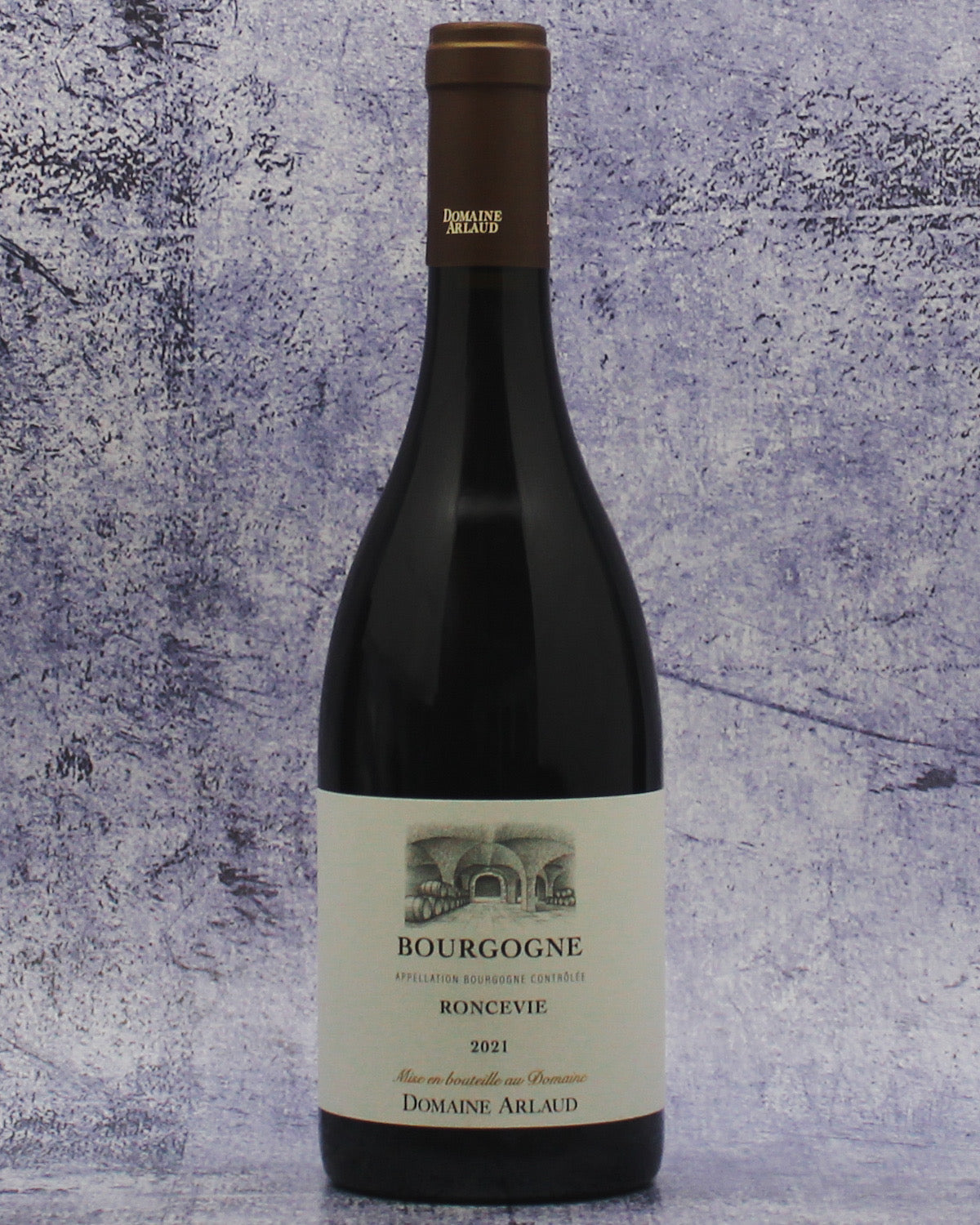From: Bourgogne, France
Varietal: Pinot Noir
Wine Specific Notes: The Roncevie vineyard was planted with Pinot Noir vines in 1964 and 1965, owned by Domaine Arlaud, and was originally classified as Gevrey-Chambertin land for vines. However, in 1964, the same year Joseph Arlaud bought the plot, a decree reclassified the Arlaud property as Bourgogne but not the surrounding land. This historical decree changed the official appellation designation of Roncevie from Gevrey-Chambertin to a Bourgogne classification, despite the vineyard's location and the characteristics of its wine that align closely with Gevrey-Chambertin standards.
This vineyard is particularly noted for producing wines that, while officially classified under the broader Bourgogne appellation, offer a profile deeply reminiscent of the Gevrey-Chambertin terroir. Additionally, the Roncevie lieu-dit, up until 1964, was considered part of the Gevrey-Chambertin Villages, and half of this vineyard still retains the Gevrey Villages classification, while the other part was declassified due to political reasons. This historical and political context underscores the complexity of Burgundy's appellation system and how it can affect vineyard classifications.
Despite its official classification, the Roncevie vineyard shares many characteristics with its Gevrey-Chambertin neighbors, including soil composition and microclimate, contributing to the distinct quality and style of its highly regarded wines that are reflective of the region's terroir.
Taste: On the nose, this wine opens with aromatics of rose petals, wild raspberries, and a hint of underbrush woven with subtle nuances of blueberries, raspberries, and irises. As the wine unfolds on the palate, it reveals rich flavors, including succulent red and dark cherry, wild strawberry, and a zestful touch of orange rind. The fruit profile is lush yet precisely balanced, avoiding any sense of overripeness, and is beautifully complemented by a medium-bodied and juicy texture. Fine, dusty tannins provide an elegant framework, enhancing the wine's lovely texture and a refined finish with a hint of baking spices.
Pairing: Roasted duck breast with a cherry sauce would be the classic pairing. The duck's gamey richness and sweet-tart cherry sauce beautifully echo the wine's red and dark cherry notes. The wine's fine tannins are perfect for cutting through the duck's fat. A pork tenderloin with a wild berry compote can't be beaten for something slightly sweeter. The pork's natural sweetness, combined with the berry compote, perfectly complements the wine's wild raspberry and strawberry notes, creating a beautiful balance. And we love the idea of a roasted vegetable tart for a vegetarian option. The earthy flavors of the roasted root vegetables bring out similar undertones in the wine, while the buttery pastry is just right with the wine's fine tannins and medium body.
Duck With Cherries and Red Wine Vinegar
By David Tanis
About: Domaine Arlaud is a distinguished wine estate based in the heart of Burgundy's Côte de Nuits, in the village of Morey-Saint-Denis. This family-owned domaine has a rich history that began during World War II when Joseph Arlaud from Ardèche married Renée Amiot, a woman from a Burgundian family with deep roots in the local wine culture. Their union brought parcels of land in the prestigious vineyards of Côtes de Nuits, laying the foundation for Domaine Arlaud. Joseph expanded these holdings from 1949 onwards, incorporating their historic 14th-century building in 1966 for wine aging—a feature now iconic on their labels.
Embracing a forward-thinking approach, Domaine Arlaud was among the first in Burgundy to move away from "modern agriculture" practices that compromised both environmental integrity and the terroir's uniqueness—a value deeply revered by the Cistercian monks since the 1200s. By 1998, the estate eliminated herbicide use, drastically reduced chemical treatments, and, by 2004, fully embraced organic principles. Also, in 2004, to address the issue of soil compaction, a byproduct of mechanized cultivation, the estate reintroduced horse plowing. This traditional method revitalized the soil, enhanced root development, and ultimately elevated the expressive quality of their wines and overall vineyard and surrounding land health.
Formalizing this commitment, Domaine Arlaud obtained Organic Certification from Veritas in 2010 and became the first in Morey Saint Denis to achieve biodynamic certification by Biodyvin in 2014.
Under the guidance of Cyprien Arlaud, the current generation, the domaine has embraced biodynamic farming practices, ensuring that their cultivation methods are in harmony with the environment. A key aspect of his philosophy is minimal intervention in the cellar, emphasizing elegance, lower extraction levels, and reducing the use of new wood to almost none for the Bourgogne wines and 15-30% for the rest of their lineup. The domaine practices partial whole cluster fermentation on their upper-level wines, depending on the stems' vintage and ripeness.
Domaine Arlaud's cellars, known for being among the coldest in the Côtes de Nuits, aid in pursuing a slow, non-interventionist vinification process with minimal use of sulfur dioxide. All their wines are bottled unfined and unfiltered, a further testament to their commitment to natural wine-making methods. Their portfolio boasts a range of Pinot Noir vineyards in prime areas of Morey-Saint-Denis, Chambolle-Musigny, and Gevrey-Chambertin, including prestigious holdings in grand crus like Clos de la Roche.
Varietal: Pinot Noir
Wine Specific Notes: The Roncevie vineyard was planted with Pinot Noir vines in 1964 and 1965, owned by Domaine Arlaud, and was originally classified as Gevrey-Chambertin land for vines. However, in 1964, the same year Joseph Arlaud bought the plot, a decree reclassified the Arlaud property as Bourgogne but not the surrounding land. This historical decree changed the official appellation designation of Roncevie from Gevrey-Chambertin to a Bourgogne classification, despite the vineyard's location and the characteristics of its wine that align closely with Gevrey-Chambertin standards.
This vineyard is particularly noted for producing wines that, while officially classified under the broader Bourgogne appellation, offer a profile deeply reminiscent of the Gevrey-Chambertin terroir. Additionally, the Roncevie lieu-dit, up until 1964, was considered part of the Gevrey-Chambertin Villages, and half of this vineyard still retains the Gevrey Villages classification, while the other part was declassified due to political reasons. This historical and political context underscores the complexity of Burgundy's appellation system and how it can affect vineyard classifications.
Despite its official classification, the Roncevie vineyard shares many characteristics with its Gevrey-Chambertin neighbors, including soil composition and microclimate, contributing to the distinct quality and style of its highly regarded wines that are reflective of the region's terroir.
Taste: On the nose, this wine opens with aromatics of rose petals, wild raspberries, and a hint of underbrush woven with subtle nuances of blueberries, raspberries, and irises. As the wine unfolds on the palate, it reveals rich flavors, including succulent red and dark cherry, wild strawberry, and a zestful touch of orange rind. The fruit profile is lush yet precisely balanced, avoiding any sense of overripeness, and is beautifully complemented by a medium-bodied and juicy texture. Fine, dusty tannins provide an elegant framework, enhancing the wine's lovely texture and a refined finish with a hint of baking spices.
Pairing: Roasted duck breast with a cherry sauce would be the classic pairing. The duck's gamey richness and sweet-tart cherry sauce beautifully echo the wine's red and dark cherry notes. The wine's fine tannins are perfect for cutting through the duck's fat. A pork tenderloin with a wild berry compote can't be beaten for something slightly sweeter. The pork's natural sweetness, combined with the berry compote, perfectly complements the wine's wild raspberry and strawberry notes, creating a beautiful balance. And we love the idea of a roasted vegetable tart for a vegetarian option. The earthy flavors of the roasted root vegetables bring out similar undertones in the wine, while the buttery pastry is just right with the wine's fine tannins and medium body.
Duck With Cherries and Red Wine Vinegar
By David Tanis
About: Domaine Arlaud is a distinguished wine estate based in the heart of Burgundy's Côte de Nuits, in the village of Morey-Saint-Denis. This family-owned domaine has a rich history that began during World War II when Joseph Arlaud from Ardèche married Renée Amiot, a woman from a Burgundian family with deep roots in the local wine culture. Their union brought parcels of land in the prestigious vineyards of Côtes de Nuits, laying the foundation for Domaine Arlaud. Joseph expanded these holdings from 1949 onwards, incorporating their historic 14th-century building in 1966 for wine aging—a feature now iconic on their labels.
Embracing a forward-thinking approach, Domaine Arlaud was among the first in Burgundy to move away from "modern agriculture" practices that compromised both environmental integrity and the terroir's uniqueness—a value deeply revered by the Cistercian monks since the 1200s. By 1998, the estate eliminated herbicide use, drastically reduced chemical treatments, and, by 2004, fully embraced organic principles. Also, in 2004, to address the issue of soil compaction, a byproduct of mechanized cultivation, the estate reintroduced horse plowing. This traditional method revitalized the soil, enhanced root development, and ultimately elevated the expressive quality of their wines and overall vineyard and surrounding land health.
Formalizing this commitment, Domaine Arlaud obtained Organic Certification from Veritas in 2010 and became the first in Morey Saint Denis to achieve biodynamic certification by Biodyvin in 2014.
Under the guidance of Cyprien Arlaud, the current generation, the domaine has embraced biodynamic farming practices, ensuring that their cultivation methods are in harmony with the environment. A key aspect of his philosophy is minimal intervention in the cellar, emphasizing elegance, lower extraction levels, and reducing the use of new wood to almost none for the Bourgogne wines and 15-30% for the rest of their lineup. The domaine practices partial whole cluster fermentation on their upper-level wines, depending on the stems' vintage and ripeness.
Domaine Arlaud's cellars, known for being among the coldest in the Côtes de Nuits, aid in pursuing a slow, non-interventionist vinification process with minimal use of sulfur dioxide. All their wines are bottled unfined and unfiltered, a further testament to their commitment to natural wine-making methods. Their portfolio boasts a range of Pinot Noir vineyards in prime areas of Morey-Saint-Denis, Chambolle-Musigny, and Gevrey-Chambertin, including prestigious holdings in grand crus like Clos de la Roche.

